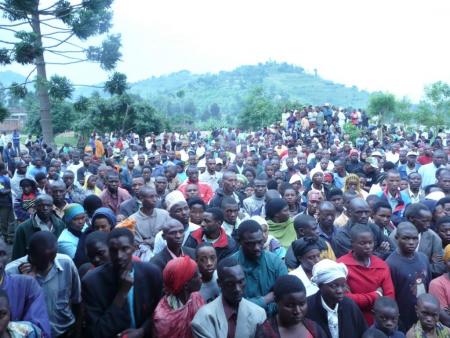News
 If East African governments want to ensure a sustainable energy supply as well as abate deforestation and use of firewood for cooking, they must diversify sources of energy to meet their population’s growing demand for energy. To this end, the Energy Sector Management Assistance Program (ESMAP) was invited by the African Union Commission to present ways of funding, mitigating risks and developing geothermal plants to energy practitioners and policymakers at a regional geothermal workshop in Kigali, Rwanda at the end of 2010. The workshop addressed challenges and barriers to developing geothermal energy in 11 East African countries.
If East African governments want to ensure a sustainable energy supply as well as abate deforestation and use of firewood for cooking, they must diversify sources of energy to meet their population’s growing demand for energy. To this end, the Energy Sector Management Assistance Program (ESMAP) was invited by the African Union Commission to present ways of funding, mitigating risks and developing geothermal plants to energy practitioners and policymakers at a regional geothermal workshop in Kigali, Rwanda at the end of 2010. The workshop addressed challenges and barriers to developing geothermal energy in 11 East African countries.
Geothermal is a renewable, clean, abundant, and versatile natural resource ready to meet escalating energy needs. Fortunately, the Rift Valley System in the East and Central Africa has abundant geothermal energy potential capable of generating over 15000 MW.
The geothermal training workshop focused on strengthening the capacity of member countries to develop an adequate policy, institutional and regulatory framework. It also aimed to attract private investments into the region’s geothermal sector namely Burundi, Comoros, Djibouti, DR Congo, Rwanda, Ethiopia, Kenya, Tanzania, Uganda, Zambia and Eritrea.
Tips on how to mitigate risks of geothermal development, raise funds for geothermal projects, and optimize the conceptual design of a geothermal power plant were presented by a Senior Geothermal Specialist, Magnus Gehringer of ESMAP. Gehringer urged participants to be realistic about private sector involvement in the early-stages of geothermal project development. He advised governments to take the lead in funding exploration and development of geothermal resources such as feasibility studies and test drillings. He also shared lessons learned from other countries.
The Kigali geothermal workshop recommended that Governments should:
- Put geothermal resource exploration, development and utilization under the energy law or the mineral law.
- Take the lead role in geothermal exploration and development by funding up-front exploration costs and by regulating their development.
- Build institutional, human and infrastructure capacity necessary for the development of geothermal energy.
- Enact laws to govern and regulate the participation of the private sector in geothermal development.
In addition the African Union Commission was charged with the responsibility of assisting governments in implementing the above recommendations through guidelines, providing resources and technical assistance, and facilitating the exchange of knowledge and experiences among countries.
The forum, organized by the African Union, brought together about 100 participants from utilities and regulating firms, and ministries of energy and geological survey to address challenges and barriers to the development of geothermal resources in 11 East African countries.
Related Presentation and Publication:
- ESMAP Presentation:Considerations on Planning and Financing Geothermal Power Generation in East-Africa by a Senior Geothermal Specialist, Magnus Gehringer.
- Kigali Recommendation On The Way Forward: Regional Geothermal Training Workshop, Dec 7-11, 2010.
Related Links:
- ESMAP's Renewable Energy Market Transformation Initiative (REMTI)
- Africa Union Commission Regional Geothermal Training Website
Related Stories:
